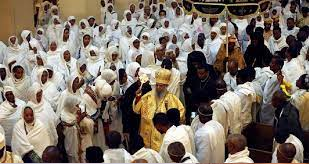
Easter, which commemorates the Resurrection of Jesus and the triumph over death, is a deeply sacred and significant holiday celebrated by millions of people in Ethiopia and around the world.
In Ethiopia, the Festival holds profound religious and cultural importance, marking the resurrection of Jesus Christ. The celebration is deeply rooted in the country’s rich Christian heritage and it is a time for reflection on faith, renewal and hope. Families, friends and communities come together to reflect on the values of the Festivals, engaging in religious services and partaking in vibrant traditions.
Easter, also locally called Fasika, fosters unity and togetherness, emphasizing values such as love, forgiveness and devotion, while also serving as an occasion to strengthen bonds within families and communities.
One of the most distinctive aspects of Ethiopian Easter is the period of fasting that proceeds the holiday, known as Lent. This 55-day period of fasting and prayer is observed by Ethiopian Orthodox and Catholic Christians as a time of spiritual purification, preparing the body and soul for the celebration of Christ’s resurrection. During this time, followers abstain from meat, dairy, and other animal products, focusing instead on a diet of fruits, vegetables, and plant-based foods. The fast is not only a physical discipline but also a time for deep spiritual reflection, prayer, and repentance. It allows believers to strengthen their faith, deepen their connection with God, and remember the suffering Christ endured. The fast culminates in the joyous celebration of Easter, making the holiday even more meaningful as it marks the end of a period of self-discipline and penance, followed by the triumphant celebration of Christ’s resurrection.
From the solemn days of Lent to the joyous celebrations of Easter Sunday, the Ethiopian Christian communities comes together to commemorate the life, death, and resurrection of Jesus.
The rich tapestry of traditions, rituals, and customs that define the Ethiopian Easter celebration reflects the deep spiritual devotion and cultural pride of the Ethiopian people. As believers come together to worship, fellowship, and feast, the true essence of Easter shines brightly in the hearts of Ethiopians. One of the key messages of the holiday is helping others, offering both financial and in-kind support to those in need. This act of charity ensures that everyone can partake in the joy of the holiday, spreading happiness and reinforcing the spirit of compassion and unity.
Next Sunday, April 20th Ethiopian Christians will observe Fasika. The culmination of the fasting period is marked by a joyous celebration filled with colorful processions and gatherings with family and friends, in a manner that Easter signifies the triumph of life over death and the victory of light over darkness and good over evil.
This powerful ritual reflects the deeper spiritual meaning of the holiday, as believers come together to celebrate the resurrection of Christ and the renewal of hope and faith.
Easter is a celebration of faith, culture, and tradition that holds deep significance for the Ethiopian people. Blending solemn religious observances with rich cultural customs and joyful festivities, Ethiopian Easter—Fasika—brings communities together in a spirit of unity and reverence. As believers gather to commemorate the resurrection of Jesus Christ, they also honor their shared heritage and core values. The celebration serves as a powerful reminder of love, forgiveness, hope, and renewal, creating lasting memories and strengthening the bonds of family, friendship, and fellowship across generations.
During Ethiopian Easter, several core societal values are emphasized and celebrated, reflecting the deep-rooted cultural and spiritual identity of the nation. These values—such as compassion, generosity, humility, forgiveness, and communal harmony—serve as important pillars of Ethiopian life. They guide how people relate to one another, reinforcing a strong sense of unity, respect, and mutual support. The holiday becomes more than just a religious event; it is a time when families and communities come together, share with those in need, and renew their commitment to living with purpose and empathy. These values not only define the spirit of Fasika but also shape the everyday interactions and traditions that make Ethiopian society unique.
Another key societal value reflected during Ethiopian Easter is generosity. While generosity is a daily practice for many Ethiopians, it becomes even more pronounced during this holiday. People open their hearts and homes to friends, family, and even strangers, offering warm hospitality and sharing meals with those in need. This spirit of giving is a central aspect of the Easter celebration, serving as a powerful reminder of the importance of compassion and helping others.
Moreover, Ethiopian Easter is a time when people show compassion and empathy toward others. This often includes visiting the sick, offering forgiveness, and extending kindness to those who are less fortunate. Such acts of compassion reflect the deeply rooted values of love, understanding, that are central and at the heart of Ethiopian society.
In addition, Ethiopian Easter is a deeply spiritual holiday, with faith playing a central role in the lives of the Ethiopian people. This spiritual depth is reflected in the rituals, prayers, and traditions observed throughout the Easter season. It serves as a powerful reminder of the significance of faith and belief in shaping both individual lives and the broader fabric of society.
Moreover, Ethiopian Easter is not only a religious observance but also a vibrant celebration of Ethiopian culture and traditions. Many people wear traditional clothing visit their family members, neighbors, and relatives. On the eve of Easter, communities gather for church services that continue through the night into the early morning. Churches are filled with worshippers dressed in white, with women wearing elegant white dresses and head coverings, creating a serene and spiritually uplifting atmosphere.
Easter in Ethiopia is a time of renewal, forgiveness and hope. It symbolizes the triumph of life over death and serves as a poignant reminder of the significance of faith and community. The rich symbolism of the holiday is embodied in the intricate rituals and customs observed by the Ethiopian Christian community.
In sum, Ethiopian Easter is a uniquely enriching experience that allows to learn more about the country’s deep religious and cultural heritage. Combining centuries-old traditions with profound spiritual significance, the holiday is a time of joy, reflection, and renewal. It captures the essence of the Ethiopian people, celebrating both faith and community while honoring cultural legacy.
BY TEWODROS KASSA
THE ETHIOPIAN HERALD FRIDAY 18 APRIL 2025





